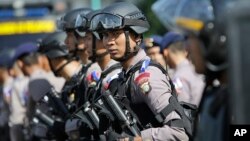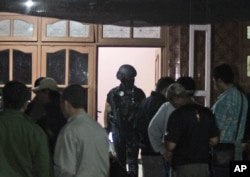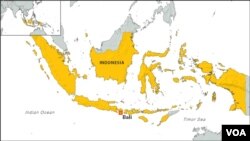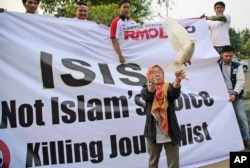Despite foiling an alleged plot by Islamic militants to assassinate public figures, Indonesian officials believe a credible threat of terrorist attacks remains in the year-end holiday season in this predominantly Muslim nation, especially against minority Christians.
The government has deployed 150,000 security personnel across the country to safeguard churches, airports and other public places, while also intensifying a manhunt for Indonesia's most wanted militant, Abu Wardah Santoso, who has pledged allegiance to the Islamic State group.
"We got quite intensive intelligence details about the possibility of radical attacks anytime from now to the near future," said Luhut Pandjaitan, a Cabinet minister in charge of security and political affairs.
'On high alert'
"So, we are on high alert, especially at the airports and some strategic points" in a national security sweep called "Operation Candle," he said.
Separately, national police chief General Badrodin Haiti said that "there are many possible threats and vulnerabilities, ranging from conventional crimes to terrorism and radicalism."
The remarks come after the weekend arrests of nine suspected Muslim militants who authorities allege planned to attack government officials and minority Shi'ite Muslims.
Most Muslims in Indonesia, which has the world's largest Islamic population, belong to the Sunni branch of the religion.
Police announced Monday that intelligence gleaned from the suspects and evidence seized from their hideouts revealed an elaborate plot to conduct attacks on Indonesia's main islands of Java, Sumatra and Borneo.
At the same time, about 1,300 security personnel are hunting for Santoso, the leader of a militant group known as the East Indonesia Mujahidin. He has taken responsibility for the killing of several police officers and has pledged allegiance to the Islamic State group in Syria and Iraq, Pandjaitan said.
Santoso also faces charges of running an extremist training camp in Poso, a flashpoint of terrorism in Central Sulawesi where a Muslim-Christian conflict killed at least 1,000 people from 1998 to 2002.
Haiti, the police chief, said government forces were pursuing about 40 militants who split into smaller groups and withdrew when police and soldiers raided their camp in a mountainous forest in Poso on Monday, and found a male corpse along with five bombs, explosive materials and cooking wares.
Joined IS
Indonesian authorities estimate that more than 800 Indonesians have joined the Islamic State group in Syria or Iraq.
For the first time since the 1990s and the Afghan jihad, extremists from Indonesia, Malaysia and other places in Southeast Asia are traveling abroad in an organized fashion to join a global militant movement, picking up battlefield skills and militant contacts.
Security officials fear they could take part in terrorism on their return to Southeast Asia, as those trained in Afghanistan did in attacks such as the 2002 Bali bombings, which killed 202 people. Radicals at home also could heed the Islamic State group's exhortations to carry out revenge attacks on Western targets.
Australian Attorney General George Brandis told The Australian newspaper during high-level security meetings in Indonesia's capital, Jakarta, on Monday that the IS has ambitions to elevate its presence and level of activity in Indonesia by establishing a "distant caliphate."
But analysts have played down such fears, saying they're just recognition that Indonesia has a substantial problem that security officials were inclined to underplay in the past.
"It's less something to be taken literally and more an indication that the lights have gone on in Jakarta," said Greg Barton, a counterterrorism expert at Australia's Deakin University. "It would make sense for them to try and engage with Indonesia and Southeast Asia if they could."
Indonesia has suffered a spate of deadly attacks by the Jemaaah Islamiyah network in the past. But strikes in recent years have been smaller and less deadly and have targeted government authorities, mainly police and anti-terrorism forces.







